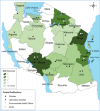Addressing the workforce capacity for public health surveillance through field epidemiology and laboratory training program: the need for balanced enhanced skill mix and distribution, a case study from Tanzania
- PMID: 32774617
- PMCID: PMC7388632
- DOI: 10.11604/pamj.2020.36.41.17857
Addressing the workforce capacity for public health surveillance through field epidemiology and laboratory training program: the need for balanced enhanced skill mix and distribution, a case study from Tanzania
Abstract
Introduction: Skill mix refers to the range of professional development and competencies, skills and experiences of staff within a particular working environment that link with specific outcome while responding to client needs. A balanced skill-mix and distribution of core human resources is important to strengthen decision-making process and rapid responses. We analysed graduates´ information of the Tanzania Field Epidemiology and Laboratory Training Program (TFELTP) between 2008-2016, distribution of skill-mix and the surveillance workforce-gaps within regions.
Methods: Trainees´ data of nine cohorts enrolled between 2008 and 2016 were extracted from the program database. Distribution by sex, region and cadres/profession was carried out. An indicator to determine enhanced-skill mix was established based on the presence of a clinician, nurse, laboratory scientist and environmental health officer. A complete enhanced skill-mix was considered when all four were available and have received FELTP training.
Results: The TFELTP has trained 113 trainees (male=71.7%), originated from 17 regions of Tanzania Mainland (65.4% of all) and Zanzibar. Clinicians (34.5%) and laboratory scientists (38.1%) accounted for the most recruits, however, the former were widely spread in regions (83% vs. 56%). Environmental health officers (17.7%) were available in 39% of regions. The nursing profession, predominantly lacking (6.2%) was available in 22% of regions. Only two regions (11.7%) among 17 covered by TFELTP presented complete skill-mix, representing 7.7% of Tanzanian regions. Seven regions (41%) had an average of one trainee.
Conclusion: The TFELTP is yet to reach the required skill-mix in many regions within the country. The slow fill-rate for competent and key workforce cadres might impede effective response. Strategies to increase program awareness at subnational levels is needed to improve performance of surveillance and response system in Tanzania.
Keywords: Tanzania; Tanzania Field Epidemiology and Laboratory Training Program; enhanced-skill mix; public health surveillance system; skill gap; workforce.
© Susan Fred Rumisha et al.
Conflict of interest statement
The authors declare no competing interests.
Figures




Similar articles
-
The Tanzania Field Epidemiology and Laboratory Training Program: building and transforming the public health workforce.Pan Afr Med J. 2011;10 Supp 1(Suppl 1):9. Epub 2011 Dec 14. Pan Afr Med J. 2011. PMID: 22359697 Free PMC article.
-
Evaluation of a New Field Epidemiology Training Program Intermediate Course to Strengthen Public Health Workforce Capacity in Tanzania.Public Health Rep. 2021 Sep-Oct;136(5):575-583. doi: 10.1177/0033354920974663. Epub 2021 Feb 4. Public Health Rep. 2021. PMID: 33541215 Free PMC article.
-
One Health concept for strengthening public health surveillance and response through Field Epidemiology and Laboratory Training in Ghana.Pan Afr Med J. 2011;10 Supp 1(Suppl 1):6. Epub 2011 Dec 14. Pan Afr Med J. 2011. PMID: 22359694 Free PMC article.
-
The role of Namibia Field Epidemiology and Laboratory Training Programme in strengthening the public health workforce in Namibia, 2012-2019.BMJ Glob Health. 2021 Apr;6(4):e005597. doi: 10.1136/bmjgh-2021-005597. BMJ Glob Health. 2021. PMID: 33849899 Free PMC article. Review.
-
A scoping review on how field epidemiology training programs are addressing regional and global health priorities.Front Public Health. 2024 Dec 18;12:1490125. doi: 10.3389/fpubh.2024.1490125. eCollection 2024. Front Public Health. 2024. PMID: 39744370 Free PMC article.
Cited by
-
Tanzania's first Marburg Viral Disease outbreak response: Describing the roles of FELTP graduates and residents.PLOS Glob Public Health. 2024 May 29;4(5):e0003189. doi: 10.1371/journal.pgph.0003189. eCollection 2024. PLOS Glob Public Health. 2024. PMID: 38809954 Free PMC article.
-
Impact Evaluation of the Kenya Frontline Field Epidemiology Training Program: Repeated-Measures Study.JMIR Med Educ. 2021 Jan 8;7(1):e18956. doi: 10.2196/18956. JMIR Med Educ. 2021. PMID: 33416507 Free PMC article.
References
MeSH terms
LinkOut - more resources
Full Text Sources
Miscellaneous
